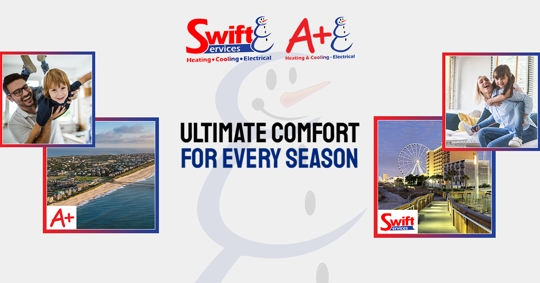From Ocean Isle Beach to Wilmington and everywhere in between, homeowners along the North Carolina coastline are no strangers to strong storms and the destruction they may bring. Whether it’s severe thunderstorms throughout the year or hurricanes during hurricane season, you can minimize the devastation and hassle of weather-related losses when you know how to protect your HVAC system from storm damage.
In our most recent blog, A+ Heating & Cooling – Electrical shares tips to prepare your air conditioning equipment ahead of foul weather and how to safely use it when storms roll in.
Tips to Protect Your HVAC System from Storm Damage
Thunderstorms and hurricanes pose a risk of damage to outdoor heating and cooling equipment primarily due to flooding and high winds. Electrical surges are another risk to these appliances and other household devices. To protect your AC unit from storm damage, safeguard your outdoor heating and cooling units with these measures:
Elevate HVAC Units
When water levels rise due to a hurricane storm surge or heavy rainfall, your outdoor heat pump or air conditioning unit is at risk.
- Debris-filled floodwaters seep into these systems, and components are exposed until water levels recede, which can take days or weeks. The water can cause short-circuiting, corrosion, and deterioration of the components held within the outdoor unit, which will require components or even the entire unit to be replaced.
- Harmful bacteria and mold can grow inside the unit during flooding, which can enter your home’s air supply when you start up the system.
Raising your outdoor air conditioner or heat pump unit above flood levels will protect your HVAC system from storm damage related to standing floodwaters. If your unit is installed on the ground, have it relocated to a raised brick or concrete pad, or a secured platform attached to the home. Indoor HVAC equipment is also vulnerable to flood damage, so consider having these units professionally relocated to upper floors or attic spaces if possible.
Secure & Shield HVAC Equipment
Strong winds and sweeping floodwaters can detach your outdoor unit from its mounting pad. Make sure mounts securing the unit to its base are undamaged and properly fastened. Use hurricane tie-down straps with high-wind resistance ratings to anchor the unit to its foundation and protect the HVAC system from storm damage.
High winds turn debris into projectiles that could penetrate and batter the HVAC unit. Winds can also deposit excessive dirt and other matter into your unit, which has the potential to cause damage. Protect your heating and cooling system from storm damage by covering the unit ahead of a storm using a weatherproof tarp, or cut plywood that is secured to the ground on all sides – do not operate the unit once a cover has been installed.
You can also protect the unit from storm damage by removing items from your property that could become projectiles. Store outdoor furniture and patio items indoors. Trim back branches hanging near the air conditioner, and remove dead limbs from nearby trees.
How to Safely Use HVAC Systems During Storms
To protect your HVAC system from bad weather and storm damage, learn how to safely use your heating and cooling system in the midst of inclement weather.
- Turn off power to the HVAC unit to prevent damage caused by electrical surges and flooding.
- A few hours before the storm hits, lower the temperature indoors to precool the house and keep living areas comfortable longer once you must shut off the air conditioning system.
- After a storm has passed, remove the cover from the unit as soon as safely possible to avoid moisture damage within the air conditioner.
- Clear away debris gathered along the exterior of your HVAC unit for proper airflow.
- Inspect the outdoor air conditioner or heat pump for damage. Upon inspection, if the unit is undamaged, you can turn the cooling system back on.
- If you see visual damage or if your unit has been exposed to standing floodwaters, do not turn it on. Call a professional to make repairs and give you the “all clear” before continuing use of your cooling unit.
HVAC Repairs After Strong Storms and Hurricanes
The advice above will help you best protect outdoor HVAC units from storm damage, but there’s always a possibility that a hurricane or severe thunderstorm could cause some harm to your home’s heating and cooling equipment. If you find damage to your air conditioner or other HVAC equipment after a storm, contact the heating, air conditioning, and indoor air quality technicians at A+ Heating & Cooling – Electrical to schedule HVAC repairs and have an HVAC technician safely restore your home’s comfort systems.
